Why Kratom Is Not Being Studied
Kratom, a tropical tree native to Southeast Asia, has gained popularity in recent years for its purported medicinal properties. However, despite the growing interest and use of kratom, there is a surprising lack of research on its benefits and potential risks. In this blog article, we will explore the reasons why kratom is not being studied and what needs to be done to encourage more research on this controversial substance.
Kratom’s legal status:
The legality of kratom is a major obstacle in conducting research on its effects. In many countries, including the United States, kratom is classified as a Schedule I drug, which means that it is considered to have a high potential for abuse and no accepted medical use. This classification makes it extremely difficult to obtain funding and approvals for research studies on kratom.
Lack of funding:
Another major barrier to kratom research is the lack of funding. As a natural substance, kratom cannot be patented, which means that pharmaceutical companies have little incentive to invest in research. Additionally, government agencies are often reluctant to fund research on kratom due to its legal status and controversial reputation.
Limited access:
Access to kratom is another challenge facing researchers. Kratom is not widely available in most countries, and regulations surrounding its importation and distribution can be strict. This makes it difficult for researchers to obtain a consistent supply of high-quality kratom for their studies.
Lack of standardized dosing:
Kratom comes in many different strains and strengths, and there is no standardized dosing system for the substance. This makes it difficult to compare the results of different studies and to draw conclusions about the effects of kratom.
Controversial reputation:
Finally, kratom’s controversial reputation has made it difficult to study. Some researchers believe that kratom may have potential therapeutic benefits, while others have raised concerns about its potential risks and side effects. This controversy has led to conflicting reports and opinions about the substance, which can make it difficult for researchers to gain support for their studies.
Despite these challenges, there is a growing need for more research on kratom. As more people use kratom for a variety of conditions, including chronic pain, anxiety, and depression, it is important to have a better understanding of its effects and potential risks. To encourage more research on kratom, there needs to be a shift in its legal status, more funding opportunities, better access to the substance, and a standardized dosing system. By addressing these barriers, we can begin to gain a better understanding of kratom’s potential benefits and risks, and develop evidence-based guidelines for its use.
If you have questions regarding Kratom and it’s potential benefits, do not hesitate to reach out to us. Contact Us Online.







